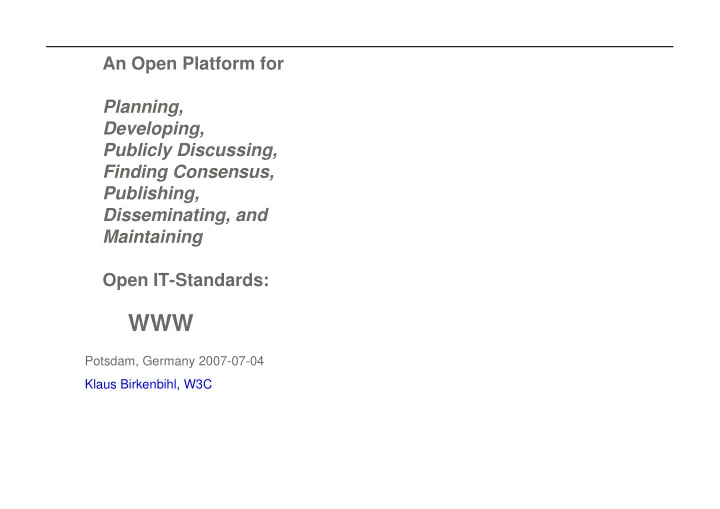

An Open Platform for Planning, Developing, Publicly Discussing, Finding Consensus, Publishing, Disseminating, and Maintaining Open IT-Standards: WWW Potsdam, Germany 2007-07-04 Klaus Birkenbihl, W3C
Introducing W3C � W3C http://www.w3.org/ the home of (X)HTML, XML, CSS, RDF, the Web and Semantic Web ... � 400+ members (the usual suspects, SMEs, users, grasroots ...) http://www.w3.org/Consortium/Member/List � 65 groups doing the work http://www.w3.org/Consortium/activities � 17 world offices all over the world http://www.w3.org/Consortium/Offices/ � a team of ~60 individuals - working and living distributed around the globe - coordinated by 3 hosts � MIT, US http://www.csail.mit.edu/ � ERCIM, Europe http://www.ercim.org/ � Keio University, Japan http://www.keio.ac.jp/ � director: WWW inventor Tim Berners Lee http://www.w3.org/People/Berners-Lee/
Making Standards at W3C � a very open and transparent process to form consensus http://www.w3.org/Consortium/Process/ � responsive to the public � a transparent patent policy http://www.w3.org/2004/02/05-patentsummary.html that protects IPRs and promotes proliferation of standards � standards are available for free (might be essential for their success!) - find all of them here: http://www.w3.org/TR/ (and use and implement!) � any other info please read: About W3C http://www.w3.org/Consortium/
Some simple rules - great impact � everything is on the web � if its not on the Web it does not exist ! � paperless � history - archiving and versioning by CVS! � proof of concept � gives us feedback (about use) � eat your own dogfood! � use standards for your work wherever you can � be your own usecase � store your ideas on the server - there you can refer to them � conform to standards - no cheap excuses please! � document your communication - use mailinglists and logged IRC � be open to new applications of standards � RSS feeds � WIKIs � Blog! � use Semantic Web applications � ... � go public - listen to the public - response to the public � its not necessary to be a member to submit ideas (though it helps) � member or not - you are invited to contribute
Outline of the process � Finding new Ideas � make a (members) Submission http://www.w3.org/Submission/ � organise/go to a Workshop http://www.w3.org/2003/08/Workshops/ � set-up an Incubator Group to develop ideas http://www.w3.org/2005/Incubator/ � Getting things started � team drafts a charter for a group http://lists.w3.org/Archives/Public/public-new-work/2007Jun/ � identifying team-contact and chair � get the "go" from the membership � working along � publish working drafts from the working group � discuss with members and the public � promote to (candidate/proposed) recommendation (aka standard)
Some of our tools � work is done in meetings (either face to face or - mostly - on phone) working group tools: http://www.w3.org/2004/12/wg-tools � logged IRC (RFC1459 http://www.ietf.org/rfc/rfc1459.txt) for minuting � Semantic Web Based Tool "Zakim" meeting and phonebridge management http://www.w3.org/2001/12/zakim-irc-bot.html � an "RRSAgent" agent to draft meeting minutes http://www.w3.org/2002/03/RRSAgent � Action tracking, Issue tracking � Outside meetings working groups use � public and members only mailing list (100s) http://lists.w3.org/Archives/Public/ � Wikis http://en.wikipedia.org/wiki/Wiki � Blogs http://en.wikipedia.org/wiki/Blog � IRC (RFC1459 http://www.ietf.org/rfc/rfc1459.txt) for instant messaging � action tracking http://www.w3.org/2005/06/tracker/ , issue tracking ... http://esw.w3.org/topic/TrackingIssues � WBS: Web-Based Straw-poll and balloting system http://www.w3.org/2002/09/wbs/1/ � ... � publishing about the results disseminating the results � "pubrule checker" http://www.w3.org/2005/07/pubrules � Quality - life after rec � validators http://www.w3.org/QA/Tools/#validators � test suites z.B. http://www.w3.org/Graphics/SVG/Test/20061213/ oder http://www.w3.org/Style/CSS/#browsers � tutorials http://www.w3.org/2002/03/tutorials � lists of implementations (see respective working group or activity pages) � translations database (SW based) http://www.w3.org/Consortium/Translation/ � talks database (SW based) http://www.w3.org/Talks/ � ...
Summary � could not mention all � maybe I fogot some important � e.g. Slidy http://www.w3.org/Talks/Tools/Slidy/ the tool that I use for my slides � technology makes life easier � we reach the community (4Mio hits/day on http://www.w3.org/) � people can access � fast � search � lots of additional information � because everthing is on the Web � many tools are available open source
See more � Most links are embedded in the slides of this talk: Undust the bottles! http://www.w3.org/2007/Talks/0704Berlin-KB/ � Related talks: � Thomas Roessler, W3C Process and Tools 101 http://www.w3.org/2007/xmlsec/w3c101 � Dan Connoly W3C Process: A Means to an End - http://www.w3.org/2005/Talks/04w3c-process/all (from Thomas Roessler's talk)
Recommend
More recommend